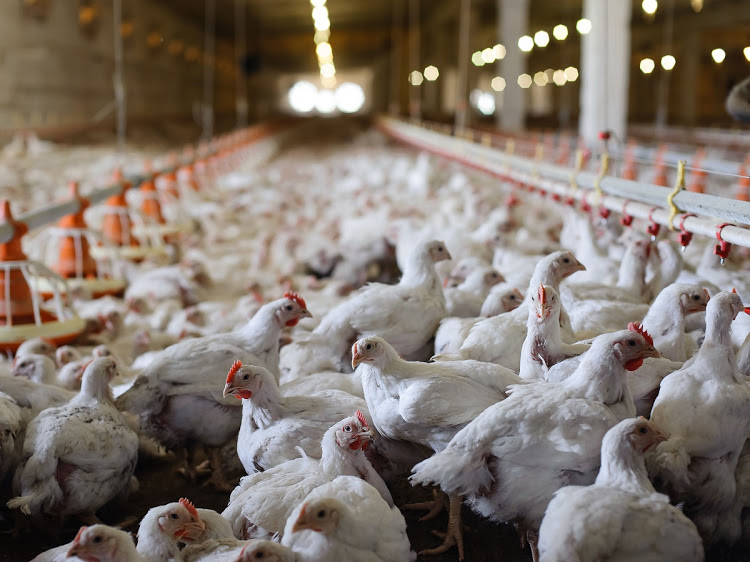Jobs await if local chicken is prioritised over imports

Job creation and preservation must be SA’s top priorities as the country seeks to rebuild its economy after huge job losses from the Covid-19 lockdowns. 2020 has been a miserable year for workers, here and around the world. The situation in SA is critical, because before the coronavirus pandemic we already had one of the world’s highest unemployment rates. Now poverty and joblessness have become an economic pandemic.
That is why every government department must put job creation at the top of their list. It is crucial for our economic recovery and future national prosperity that the government supports projects that create jobs, from infrastructure to agriculture.
As a new food and agriculture-focused trade union, the Agricultural Food and Allied Democratic Workers Union (AFADWU) seeks to prevent job losses and promote job creation in the agriculture sector and its associated value chains. The interlinked poultry and maize industries are among the sectors on which the union is focusing.
Poultry is the largest component of the agricultural sector, and the industry purchases nearly half of the maize and most of the soya produced in this country. That’s a vital combination for the economy and a vital area for the protection and creation of SA jobs.
That is why AFADWU and FairPlay believe it is important to prioritise the implementation of the Poultry Sector Master Plan signed last year with the objective of expanding our internationally competitive poultry sector.
The master plan aims to create nearly 5,000 jobs in the poultry and grain industries by 2023. It hinges on trade measures such as tariffs to curb the high volumes of predatory imports, much of which are dumped, that have plunged the local chicken industry into crisis, costing thousands of jobs. With a level playing field and fair competition, the SA industry will expand as it replaces significant volumes of predatory imports and then grows further into export markets.
The objective is to increase local production by 10% over the next few years through investment by local producers in job-creating improvements and expansion. SA chicken producers have pledged to invest R1.5bn in these projects, of which some R1bn has already been spent. This is a huge boost for an industry where investment and job creation have been curtailed for years because of increasing predatory imports.
The master plan has a number of interlocking and job-creating components, all of which will contribute to the ultimate goal of a healthy and growing domestic chicken industry serving expanding local and export markets. Firstly, it is vital that decisive action is taken, as the master plan promises, against “unfair forms of trade and any attempts to dump products in our market”. The local industry has applied to renew antidumping duties against three EU countries, and is considering anti-dumping applications against Brazil and four other EU nations.
These applications need to be finalised and acted upon speedily, because the assault on local markets and local jobs has been sustained — the master plan notes that chicken imports increased fourfold in 20 years — and will certainly resume once demand recovers as coronavirus restrictions are lifted. AFADWU will support antidumping duty applications when they are lodged because dumping costs local jobs.
Another important component of the master plan is to promote local demand. We were pleased to see that a decision to require government departments and state-owned entities to buy local chicken may be imminent. Our public servants, hospital patients and prison inmates should be eating SA chicken, not products imported from Brazil and the EU. Remember too that SA chickens eat SA grain grown by SA labour; foreign chickens don’t.
Steps have also been taken against unfair trade practices such as vague labels of origin on some imported chicken. The government has ended a dispensation that allowed SA consumers to be told that the chicken portion in a supermarket pack could have come from any one of nine countries. Unlike local chicken, which complies with strict labelling requirements, this imported chicken would be impossible to trace in the event of contamination.
We hope action is taken soon to end another food safety problem — the thawing of bulk frozen imports and repackaging and refreezing them into smaller packets for local distribution. Thawing and handling meat imports is safe only when done under strict safety protocols, and the master plan aims to eliminate the practice because of the food safety risks when the rules are not followed.
Also important is the planned increase in production for export, though this will take longer to achieve, particularly for EU markets. The master plan notes that, despite duty-free access to EU countries, SA has been unable to export chicken to the EU because the country lacks the systems needed to provide the health certificates required. Creating and staffing these facilities, and then obtaining EU approval for them, will take time.
The poultry industry master plan is a jobs plan. Every step that increases local production increases local jobs. SA has a jobs crisis, and the master plan could yield 5,000 jobs in the agricultural sector over the next three years. It must be implemented urgently.
Pukwana is general secretary of Cosatu-affiliate the Agricultural Food and Allied Democratic Workers Union. Baird is the founder of the FairPlay movement.